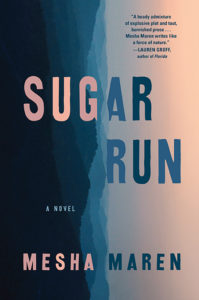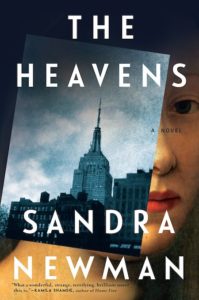5 Great Audiobooks for Spring
In Which James Tate Hill Reveals That Benjamin Dreyer Sounds Like Steve Martin
Spring has finally arrived, and with it come warmer temperatures, blooming flowers, and extra daylight. You know, happy things. And if all this pleasantness doesn’t seem like fodder for compelling books, let’s put it another way. Spring is the season of renewal, fresh starts, and new beginnings.
“It is not enough that yearly, down this hill, / April / Comes like an idiot, babbling and strewing flowers,” warns Edna St. Vincent Millay, so let me recommend five audio books to help you love spring for more than its pretty parts. Whether you’re looking for stories of starting over or a book that might help you start over, one of these titles should provide the perfect reading for your spring cleaning or outdoor jog. But before you dig in, make sure you have a good pair of noise-cancelling earphones: Spring also marks the return of lawnmowers.

Sugar Run by Mesha Maren
Narrated by Hillary Huber
Algonquin Books/HighBridge
11 hours and 9 minutes
A fresh start sounds lovely unless you’re being released from prison at age 35, having lived one fewer year as a free woman than as an inmate. In short order, Jodi McCarty meets a young mother of three with baggage of her own—the father of her children is a washed-up singer-songwriter once called the next Gram Parsons. They make their way north to Jodi’s home state of West Virginia, to a rural community where opportunities are scarce for all, and especially for class-B felons.
“For so many years, the mountains had protected this place,” Maren writes, “keeping it safe for those willing to scrape out a life. But now it seemed that a man from Florida could drive up and buy your ancestors’ land on a whim.” The family land Jodi thought she could reclaim by paying back taxes no longer belongs to her family or the local bank. Fracking enters the picture, as it has for so many West Virginians. The novel’s Appalachia is one of crime and exploitation, but Maren treats the place and its people, to the mind of this native West Virginian, with empathy and accurate detail.
The plot of Maren’s debut is also handled with skill and grace, the events of the late 1980s that put Jodi in prison woven around her efforts to start over. “I can’t believe I let this all happen to me,” laments one character, but the novel shows that blame and responsibility are complicated. Love, too, is complicated, and the novel’s lesbian characters are drawn with uncommon dimension. Sugar Run is gritty, but like the region it depicts, there’s beauty if you view it from the right angle. It’s the perfect book for your morning commute, on one of those cold spring mornings when winter refuses to let go.

Dreyer’s English: An Utterly Correct Guide to Clarity and Style by Benjamin Dreyer
Narrated by Benjamin Dreyer and Alison Fraser
Random House/Random House Audio
9 hours and 38 minutes
If a self-described guide to clarity and style written by Random House’s vice president, managing editor, and copy chief feels like a book you might rather own in hardcover to shelve with your reference books, you wouldn’t be wrong. You would also be missing out on one of the funniest, most entertaining audio books I’ve read in years. With an assist from Alison Fraser for excerpts and examples, Dreyer reads his own words with the dry timing of someone paid to tell jokes, not edit books. I should also note, before we go any further, that Dreyer’s voice bears a striking resemblance to Steve Martin crossed with Bryan Cranston.
As for the book’s invaluable content, Dreyer’s mission is not to chide but to empower, to share “the nuts-and-bolts stuff that even skilled writers stumble over” and “some of the fancy little tricks… that can make even skilled writing better.” Whether you write books, social media posts, or office emails—it’s no longer e-mails—Dreyer’s English does what any good copy editor does: helps you say what you’re trying to say so that you might be understood. The lessons and information are usually accompanied by hilarious asides sure to make them more memorable. “Only godless savages eschew the series comma,” Dreyer explains, and “as a patriotic American, he refuses to call it an Oxford comma.
It’s liberating to hear someone with the author’s expertise say that knowing how to do a thing is more important than knowing what it’s called. In this spirit, much of the book consists of practical advice, including lists of commonly confused words, frequently misspelled words, and rules for using words from another language. Again, come for the wisdom, stay for the anecdotes and trivia. Walking us through the oft-confused hanged and hung, Dreyer writes that “criminals are hanged; paintings are hung (some); also men (some). If Dreyer’s English doesn’t herald a new era in which you write mistake-free sentences, it will at least renew your faith in the editors paid to find those mistakes.

The Heavens by Sandra Newman
Narrated by Cassandra Campbell
Grove/HighBridge
8 hours and 19 minutes
With our bodies still adjusting to the dated practice of Daylight Saving Time, spring feels like the perfect season for a book involving time travel. With her fourth novel, The Heavens, Sandra Newman has written a trippy and deeply felt love story like nothing you’ve read before. Ben meets Kate at a New York party in late 2000 and quickly falls in love with this woman some might label a manic pixie dream girl. Except, Kate’s odd behavior goes deeper than cute mannerisms.
Since childhood, Kate has had the same recurring dream of living in Elizabethan England under the name Emilia. Her dream world begins to affect her reality, and the Kate who awakens each morning is not the Kate who went to sleep the night before. To Kate, however, it’s the world around her that keeps changing. Alternating between Ben’s and Kate’s point of view, the novel charts the effects of Kate’s altered reality on not only herself, but also those around her. Ben, writes Newman, “could no longer imagine being with a woman… who didn’t, as Kate did, believe New Delhi was infested by pangolins. And that New Yorkers had a tradition of flying elaborate kites on May Day. And that there was a nation in the Virgin Islands ruled by a breadfruit monarch descended from the leaders of a slave rebellion.”
If The Heavens sounds like a wild ride, it is. It’s also told with delicate, often hilarious detail. One initially thinks of inventive authors like Kelly Link or Victor LaValle, but such comparisons fray quickly—Sandra Newman is an original. Sneakily hopeful, the novel lets readers believe the magical explanation as well as the practical possibility of mental illness. Narrator Cassandra Campbell, one of the purest voices in audio books, is the perfect guide for a novel that weaves William Shakespeare and 9/11 into the same timeline, depending on your definition of time. Read The Heavens on a springtime walk full of flowers you’re unable to identify.

Help Me! by Marianne Power
Narrated by Marianne Power
Grove/Brilliance Audio
9 hours
Chronically unhappy, Marianne Power decided that for one year she would read and follow the advice of a different self-help book every month. Even though, as the old adage goes, the continued publication of new books in the self-help genre proves their ineffectiveness, what did she have to lose? “I had become,” she tells us, “that woman at weddings, the one who lurches from drunkenly dancing to Beyoncé’s “Single Ladies” to sobbing in the bathroom.”
Power selects books on money, love, and conquering one’s fears, going all in, at least for a few months. Enter Tony Robbins, he of the very white teeth and those hot coals he challenges followers to walk across. Power makes it across the coals, but the five hundred pounds Robbins charged for the cheap seats at his London seminar leave a lingering mark. This chapter begins a chain of financial setbacks. The advice of a book called Fuck It doesn’t do her friendships any favors, and the second half of Power’s year of self-help is rife with “cynicism, otherwise known as reason.”
“If you’re looking for self-help,” said George Carlin, “why would you read a book written by somebody else? That’s not self-help. That’s help.” Indeed, readers curious if self-help books really work might already be missing the point of Power’s journey. On the other hand, readers interested in a witty, self-aware, sincere exploration of what unhappiness looks and feels like should read Help Me! The strides the author makes over the course of a year are significant, but she helps herself far more than self-help helps her. Turn up the volume of Help Me! during your spring cleaning, ignoring the advice of lifestyle gurus telling you what to throw away.

The Weight of a Piano by Chris Cander
Narrated by Cassandra Campbell
Knopf/Random House Audio
9 hours and 55 minutes
Starting over almost always means wrestling with the past. For Clara, the 26-year-old auto mechanic at the center of Chris Cander’s addictive new novel, the past is a German upright piano a century and a half old, which she has never been able to play. Clara’s father bought it for her when she was a child, shortly before he and Clara’s mother died in a fire. Over time, it becomes “little more than a piano-shaped paperweight, keeping what was left of her childhood memories from floating away.” Clara’s decision to sell the instrument reveals a rich history that will soon collide with her future.
“In Russia,” Cander writes, “winters were long and people turned to music for warmth and light.” The former Soviet Union is where we find Katya, the pianist whose heartbreaking biography Cander braids with Clara’s until the two lives intersect in ways both inevitable and surprising. The author’s expertise in music—or her meticulous research—never feels inaccessible, and the novel has plenty to say about relationships as well as art.
A reluctant relationship develops between Clara and Greg, the photographer who tries to buy and eventually rents her piano for a project that involves transporting it to Death Valley. Clara follows, to Greg’s initial irritation. Greg, too, has a past that isn’t even past, and one connected to Clara by more than the piano. Cander never leads us quite where we think the story is going, however. Is it a new beginning Clara wants? Or is it an ending? The line between the two, the novel suggests, is sometimes arbitrary, no more important than a date on a calendar.




















